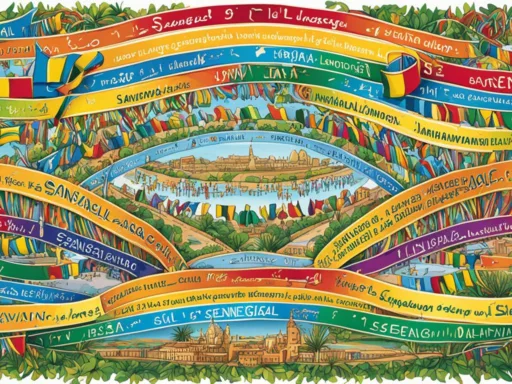Known for its captivating history and vibrant Greek culture, Greece is not only a haven for archaeologists and historians but also a linguaphile’s delight. Despite being a predominately monolingual nation with an overwhelming majority communicating in Greek, the language diversity in Greece paints a picture far more intricate than one might expect. Tapping into this linguistic mosaic, Greeks and visitors alike experience a symphony of spoken words – from the bustling mainlands resonating with modern dialects to the serene islands whispering in ancient tongues.
The harmonious blend of languages spoken in Greece manifests not just in voice but also through the extensive gestures of Greek Sign Language, bridging communities within this Hellenic landscape. For those yearning to delve deeper into the essence of Greece, understanding the nuances and breadth of its linguistic diversity is tantamount to feeling the heartbeat of Greek culture itself.
Key Takeaways
- Greek, the cornerstone of languages spoken in Greece, is a linguistic tapestry steeped in a history that dates back millennia.
- Language diversity in Greece is evidenced by a range of minority and regional dialects contributing to the multicultural narrative.
- English, as a major foreign language, is widely used especially in business and tourism sectors, underscoring Greece’s international connectivity.
- Greek Sign Language signifies the inclusive nature of Greek culture, catering to the communication needs of the deaf community.
- The commitment to maintaining language diversity in Greece mirrors the nation’s pride in its rich cultural heritage and linguistic prowess.
The Official Standpoint: Embracing the Greek Language
In the heart of the Mediterranean lies a country where the echoes of antiquity blend with the rhythms of the modern world. Greece’s officially endorsed language, Modern Greek, serves as the pulsating core of the nation’s identity. Each syllable is a testament to a long-standing history, inviting us to explore the depths of this rich linguistic heritage. As a guardian of tradition and a vector of communication, the Greek language is pivotal to the cultural and educational fabric of Greece.
Understanding Modern Standard Greek
The melody of the Greek vocabulary in daily conversation is influenced by the standardized form of Modern Greek. This vernacular, entrenched in the everyday lives of approximately 99.5% of Greeks, is a direct descendant of the Medieval tongue. Its evolution into a language of simplicity and clarity has made it an accessible bridge to the ancient world for both natives and learners alike. The continuity of Greek linguistic traditions through the use of a standardized modern dialect reflects Greece’s dedication to preserving its linguistic roots while fostering clear and unified communication.
The Historical Evolution of the Greek Language
The journey of the Greek language through time is a narrative of resilience and continuity. With a history exceeding 34 centuries, the structural integrity of Greek has withstood the test of time, maintaining the essence of its ancient predecessor. This linguistic anachronism presents a living link between the forefathers of Western philosophy and the citizens of contemporary Greece. Through it, one can traverse the dynamic pathways of the Greek language’s phonological, morphological, and syntactic evolution, exploring the layers of influence and innovation that have shaped today’s spoken and written forms.
Greek Alphabet and Phonology
The Greek alphabet, a hallmark of Greek culture, is composed of 24 characters, each resonating with unique phonetic significance. At its core lies a 5-vowel system that harmonizes with the consonants to form a language that is as melodious as the Aegean Sea. The phonological aspect of the Greek language, including its intonation and stress patterns, serves not only as the foundation for constructing meaning but also for connecting with the rhythmic cadence deeply entrenched in Greek oral traditions. This robust yet elegant alphabet demonstrates the linguistic prowess that has allowed Greek to be not only a medium of everyday communication but also a vessel of timeless literature and scholarly works.
Greece’s Regional Linguistic Tapestry
The cradle of Western civilization, Greece, is not just a treasure trove of ancient history but also home to a living kaleidoscope of regional dialects. Each dialect is a vibrant thread in the cultural fabric, enlivening the Greek tongue with distinctive local colors. Greek dialects hold stories that are interwoven with the past and present, echoing through time in every corner of the country.
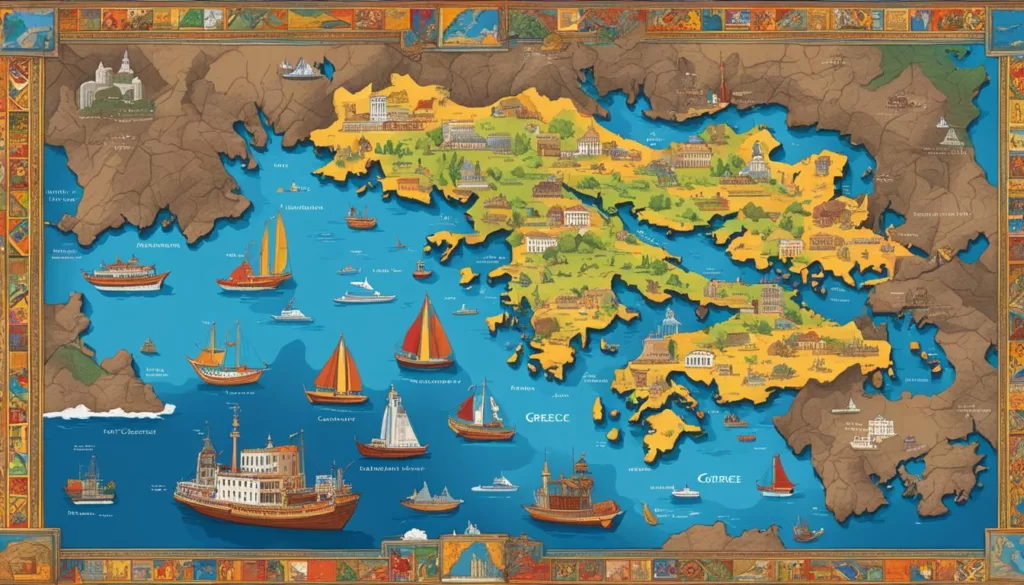
Dive into the linguistic diversity with regional dialects such as the endangered Tsakonian, a direct descendant of the Doric dialect from the time of Sparta, continuing to persist against the tides of time. Similarly, Cretan Greek meanders through the conversations in Crete and among Cretans in Athens, its linguistic currents scarcely distinguishable from Standard Greek yet bearing its own unique idiomatic expressions.
Below is an illustration of the distinct Greek dialects and their characteristics, vividly showcasing the linguistic repertoire that Greece boasts, from the Peloponnese to the shores of Crete:
| Dialect | Region | Number of Speakers | Notes |
|---|---|---|---|
| Tsakonian | Tsakonia, Peloponnese | Approximately 1,200 | Preserves archaic Greek elements; considered critically endangered |
| Cretan Greek | Crete, Diaspora | Over 500,000 | Similar to Standard Greek with regional idiomatic phrases |
| Pontic Greek | Pontus, Caucasus | About 500,000 | Deviates from Attic Greek, with influence from Medieval and Byzantine eras |
| Sarakatsanika | Northern Greece, Greek Macedonia | Not well-documented | Spoken by the nomadic Sarakatsani shepherd community |
A lesser-known dialect, Cappadocian Greek, though once believed extinct, still has whispers of its presence in Greece, especially among the Cappadocian descendants. As we traverse further up north, we encounter Sarakatsanika, an archaic dialect spoken by the Sarakatsani, who cherish their pastoral traditions alongside their linguistic heritage.
These myriad tongues, from Tsakonian to Cretan Greek, are not merely means of communication; they are guardians of Greece’s diversified legacy, encapsulating nuances that reveal the multifaceted personality of this ancient land. Understanding Greek dialects is akin to assembling a mosaic – each piece, essential and unique, contributes to the overarching splendor of Greece’s regional articulations.
Languages Spoken in Greece: A Closer Look at Dialects and Varieties
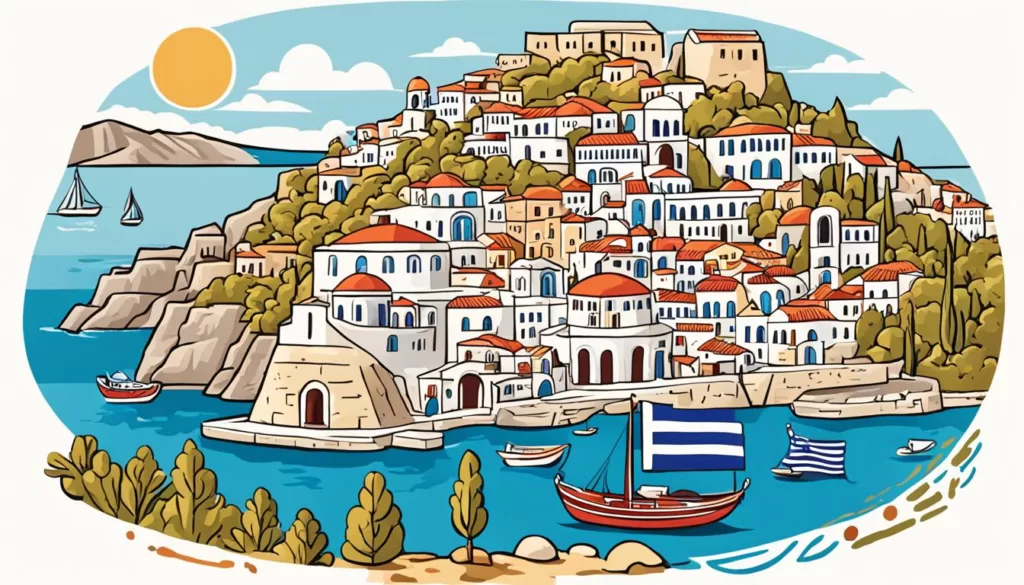
Delving deeper into Greece’s lingual treasure trove reveals a rich array of dialects and varieties that transcend the ubiquity of Modern Greek. From the steep cliffsides of the Peloponnese to the majestic landscapes of Crete and the Black Sea-coastal valleys, these distinctive tongues narrate stories from Greece’s storied past, each with their unique melody that resonates through the country’s vibrant streets and tranquil countrysides.
From the Tsakonian to the Cretan Greek
The exceptionally rare Tsakonian Greek dialect is a linguistic jewel, directly tracing its roots to ancient Doric and presently spoken by merely 1,200 individuals in Tsakonia. Intertwined with this rarity is Cretan Greek, the vernacular tongue of Crete, boasting over half a million speakers who navigate daily life with a dialect that, while audibly similar to Standard Greek, flourishes with its own regional flair. For those immersed in the linguistic shades of Greek, the variety is enthralling, revealing a Greece rich in asymmetry and tradition.
The Unique Case of Pontic Greek
Pontic Greek demonstrates the adaptive strength of language, showcasing how geographic separation and historical influences can carve a distinct linguistic path. With approximately 500,000 speakers, it’s a testament to resilience, born from Ionic Greek, reshaped by ancient dialects, and continuing to thrive amidst Greece’s diverse populace. Those who look closely will discover Pontic Greek’s spellbinding duality – a fusion of ancestral eloquence and the enduring testament of a community’s cultural survival.
Sarakatsanika: Preserving Ancient Speech
Sarakatsanika is the dialect of Greek that resounds with the timeless traditions of the Sarakatsani, a nomadic shepherd community entrenched in the northern Greek highlands. Though documentation is scarce, their commitment to this ancient form carries forward a pattern of speech that harks back to an era that the sands of time have otherwise obscured. In these rare dialects, from Tsakonian to Sarakatsanika, the voices of an ancient Greece are preserved and celebrated in the modern era.
| Dialect | Origins | Present-Day Speakers | Key Characteristics |
|---|---|---|---|
| Tsakonian Greek | Doric Greek | About 1,200 | Deviation from other Greek dialects, marked by archaic elements |
| Cretan Greek | Standard Greek | Over 500,000 | Close resemblance to Standard Greek with unique idioms |
| Pontic Greek | Ionian Greek | Approx. 500,000 | Historical influences with unique grammatical structure |
| Sarakatsanika | Ancient Greek | Undocumented | Preservation of ancient speech and pastoral traditions |
Community Voices: Minority Languages in the Hellenic Landscape
Amidst the dominant Greek language, the minority languages in Greece offer a splendid array of linguistic diversity. These tongues, woven into the very fabric of Greece’s cultural tapestry, provide vital narratives of the country’s multiethnic past and present. While some of these languages are thriving with considerable speaker communities, others teeter on the brink of extinction, each adding a distinct hue to the language diversity in Greece.
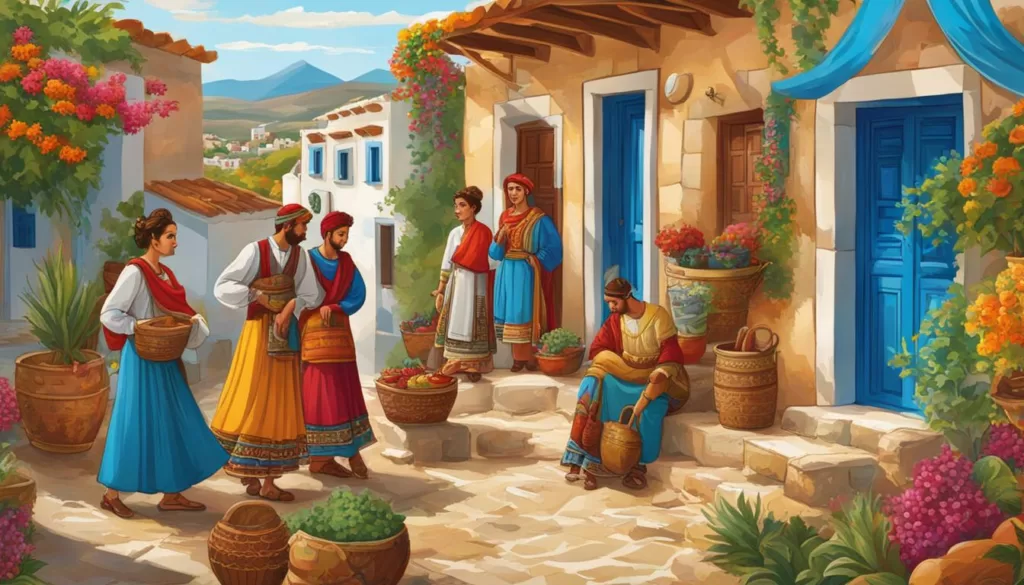
Albanian and Turkish Language Influence
Albanian in Greece, spoken by a sizable immigrant population as well as historic communities, is one of the most spoken minority languages in the country. These speakers enrich the Hellenic linguistic mosaic with their own unique cultural and linguistic nuances. Turkish in Greece, primarily used by the Muslim minority in Western Thrace known as the Western Thrace Turkish, represents another significant strand in the country’s linguistic weave. Despite changing geopolitical landscapes, the use of Turkish persists, underscoring the region’s historical and present-day connections with neighboring Turkey.
Armenian, Romani, and Other Linguistic Strands
The rich linguistic dialogue within Greece embraces Armenian and Romani as part of its chorus of minority tongues, each with unique stories and contributions to the nation’s cultural heritage. The Armenian language, brought over by a robust community, continues to persist through generations, while Romani, with its myriad of dialects, is emblematic of the Roma people’s legacy within Greece.
The Extinction of Yevanic Greek
Among the fraying threads of Greece’s linguistic quilt is Yevanic Greek, a testament to the historic Romaniotes Jewish community. This language once vibrated through synagogues and family homes but now whispers faintly in the memories of a disparate few. The preservation of Yevanic Greek is not just about saving a language, but about honoring the legacy of an entire culture woven into the country’s historic fabric.
In this chorus of endemic and migrant linguistics, the minority languages of Greece stand as bearers of diversity and reflectors of the complex human tapestry that makes up the nation. From the lively banter in Albanian communities to the solemn silence of a disappearing Yevanic Greek, Greece holds a world of languages within its borders, waiting for the attentive ear.
The Greek Diaspora: Maintaining Language Across Borders
The fabric of Greek culture is expansive, reaching far beyond the Aegean to touch the corners of distant lands where Hellenic communities continue to uphold traditions and language. The Greek Diaspora is at the heart of this global dialogue, maintaining the vibrancy and dynamism of the Greek language. Members of the diaspora, from entrepreneurs to scholars, converge around the cultural hearth of the Greek spoken word, be it through literature, commerce, or art, ensuring that the breadth of Greek influence remains unfaded across generations.
Cypriot Greek: A Blend of History and Modernity
The story of Cypriot Greek is one of resilience and adaptability. Spoken by over half a million Greek Cypriots on the island and further enlivened by communities abroad, this dialect not only encapsulates the historical essence of ancient dialects but also embraces the nuances of a modern vocabulary. As such, it remains a vibrant medium through which Cypriot identity is asserted, cherished, and seamlessly woven into the narrative tapestry of the Greek Diaspora.

Emigrant Languages: Greek Spoken Abroad
In cities like Melbourne, Toronto, and New York, the Greek language finds a new home, thriving in communities that preserve and celebrate their Hellenic ancestry. Here, Greek spoken abroad is not only a vehicle of everyday communication but also an anchor to the collective memory of a shared heritage. Whether through festive occasions, scholarly pursuits, or the simple act of storytelling, emigrant languages stand as living memorials of the Greek culture, an unyielding link to the homeland.
| Community | Location | Approximate Number of Greek Speakers | Contributions to Greek Diaspora |
|---|---|---|---|
| Cypriot Greeks | Cyprus, Australia, Canada, Americas | 1.20 million | Preserving Cypriot Greek dialect and traditions |
| Greek Americans | United States | 1.3 million | Cultural festivals, Greek language schools, and community centers |
| Greek Australians | Australia | 422,234 | Integration of Greek language in local institutions, media, and society |
| Greek Canadians | Canada | 271,405 | Keeping Greek language alive through education and cultural establishments |
The Greek Diaspora unfolds as a constellation of communities, each a beacon of cultural identity, illuminating the linguistic landscape beyond Greece’s territorial bounds. Through festivals, educational endeavors, and media, the Greek language fosters a sense of communal belonging that transcends oceans and borders. These emigrant languages, resonating amongst bustling cityscapes and quiet neighborhoods, are the heartbeat of Greek culture abroad, continuing a legacy that has endured the vicissitudes of time and space.
Greece’s Foreign Language Proficiency: English Leads the Way
In contemporary Greek society, the familiar sounds of the Greek language are often interlaced with the globally acknowledged notes of English, showcasing the country’s commitment to foreign language proficiency. The Greek education system has long embraced a multilingual approach, with English being integrated into the curriculum from the primary levels. This deliberate inclusion has cultivated a population where more than half, precisely 51%, are able to converse fluently in English. The widespread adoption of English in Greece not only facilitates international communication but also reflects the nation’s forward-thinking stance in education and global connectivity.
Beyond English, the linguistic portfolio within Greek education and society incorporates other European languages, evidencing the polyglot nature inherent in Greece’s culture. German, French, and Italian represent significant strands of the linguistic weave, each holding their own in the academic fabric and among the general populace. These languages have secured a foothold in the nation’s curricula, enriching the students’ experiences and bolstering Greece’s engagement with linguistic dexterity.
| Language | Speakers in Greece | Presence in Education | Usage in Society |
|---|---|---|---|
| English | 51% | Integrated from primary level | Business, tourism, popular culture |
| German | 9% | Offered in schools | Academia, cultural exchanges |
| French | 8.5% | Taught alongside other foreign languages | Literature, diplomatic affairs |
| Italian | 8% | Selected curricula | Trade, cuisine, arts |
The instrumental role of English in Greece, particularly within the nexus of Greek education, is noteworthy. For the young learners in Socrates’ homeland, fluency in English opens doors to a treasure trove of educational and professional opportunities, thus preparing them for the demands of a world where linguistic capabilities serve as a bridge across cultures. Greece, with its myriad spoken languages, stands as a testament to the power of education in forging not only future scholars but also global citizens adept in the art of communication.
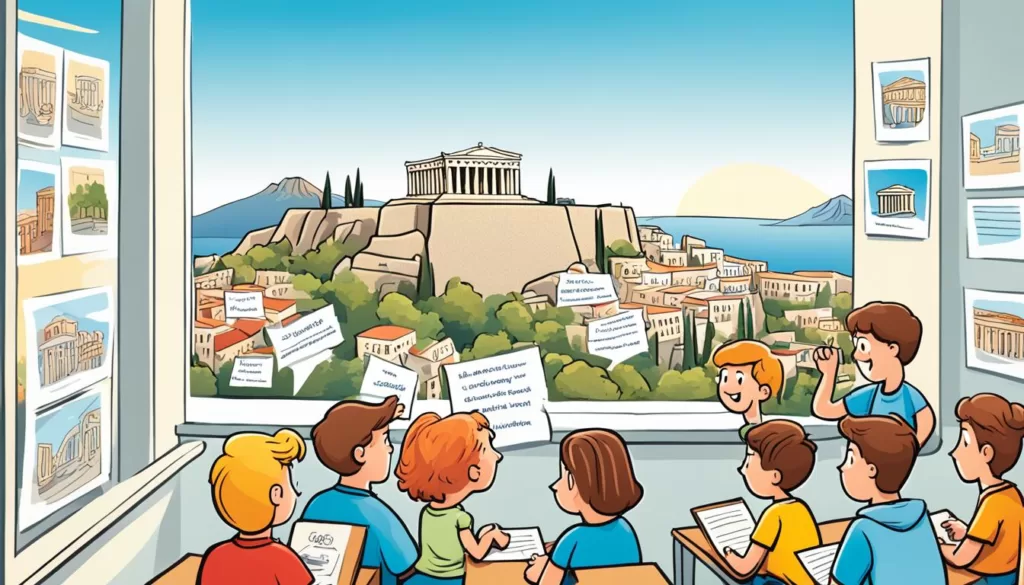
Promoting Linguistic Heritage: Education and Preservation Efforts in Greece
In Greece, the cradle of Western civilization, language is not just a medium of communication but a living testament to its rich cultural legacy. The Greek language preservation efforts reflect the nation’s commitment to safeguarding this invaluable heritage. Amidst the shimmering waters and ancient ruins lies a modern-day narrative of protection and education, elements fundamental to the survival and prosperity of linguistic diversity.
Linguistic Education in Greek Schools
Within the Greek education system, a balanced approach harmonizes the teaching of international languages with an emphatic focus on the Greek language. Educational efforts in Greece are designed to instill a deep appreciation for the nation’s linguistic traditions while equipping the youth with the tools to navigate a multilingual world. Structured curricula integrate both Modern Greek and its regional dialects, bridging the past with the present and emphasizing the narrative and aesthetic value of homegrown vernaculars.
Protecting Greece’s Endangered Languages
Among various linguistic initiatives, particular attention is given to endangered languages in Greece, such as the ancient Tsakonian dialect. With specialized programs and scholarly research, Greece aspires to rejuvenate these rare linguistic forms, ensuring they continue to enrich the Hellenic linguistic landscape for generations to come. Through these dedicated preservation efforts, languages that whisper tales of Greece’s storied past remain vibrant and audible in contemporary society.
The concerted efforts of linguists, educators, and policymakers coalesce into a concerted crusade to defend the mosaic of Greek speech. By nurturing linguistic diversity today, Greece fortifies its cultural identity for tomorrow, allowing future citizens and scholars alike to inherit a world rich in linguistic and cultural wealth.
Conclusion: The Vibrant Linguistic Landscape of Greece
In conclusion, the spoken languages in Greece do more than just facilitate communication; they are the brushstrokes on the canvas of Greek culture, illustrating a portrait rich with linguistic diversity. The Greek language, with its storied past, acts as the connective tissue that binds the citizens of Greece to their illustrious history. At the same time, the prevalence of dialects and minority languages within Greece’s borders attests to a society that acknowledges and embraces its multifaceted linguistic heritage. These idioms and tongues, which range from the endangered Tsakonian to the widely used Modern Greek, reflect a national identity shaped by historical threads and contemporary dynamism.
Educational initiatives within Greece play a crucial role in nurturing this linguistic diversity, ensuring that the Greek language, as well as its many regional and minority counterparts, thrive in a global context. The cultivation of these spoken words is a testament to Greece’s commitment to preserving the unique voices of its people. As we look at Greece today—a crucible of both time-honored tradition and modern innovation—it stands as a guardian of linguistic richness, inviting us all to a dialogue that echoes beyond the Aegean and into the wider world.
The essence of Greek culture is thus not captured solely in its ancient monuments or picturesque landscapes, but also in the harmonious coexistence of the many spoken languages in Greece. This linguistic diversity is a celebration of human expression and connection, an open invitation to explore the vibrant community that is Greece. It is the heart of the nation, beating loudly and proudly, unifying its people while simultaneously showcasing their diverse origins, stories, and perspectives.
FAQ
What are the primary languages spoken in Greece?
The primary language spoken in Greece is Greek, which is the official language and is spoken by approximately 99% of the population. A variety of regional Greek dialects also enrich the linguistic landscape, and there are several minority languages, including Albanian, Turkish, Armenian, and Romani.
What is Modern Standard Greek?
Modern Standard Greek is the official language of Greece, characterized by its use of the Greek alphabet, a streamlined syntax from its ancient roots, and a 5-vowel phonetic system. It has descended and evolved from Medieval Greek and exhibits a level of diglossia with common modern usage and archaic written forms.
How has the Greek language historically evolved?
The Greek language has a history spanning over 34 centuries, evolving from Ancient Greek through Medieval Greek to Modern Greek. Despite its evolution, it has remarkably preserved much of its syntax, morphology, and phonetics, demonstrating the language’s resilience and continuity through time.
What is the importance of the Greek alphabet and phonology?
The Greek alphabet, consisting of 24 letters, is integral to the Greek language and its identity. Greek phonology, with its system of 5 vowels and various consonant sounds, has also played a crucial role in the language’s evolution and its ability to retain its characteristics over millennia.
Can you tell me more about regional dialects in Greece?
Regional dialects in Greece, such as Tsakonian, Cretan Greek, Pontic Greek, and Sarakatsanika, each showcase unique linguistic features that reflect the history and culture of their regions. These dialects vary in similarity to Standard Greek and are an essential part of Greek cultural heritage.
What are some characteristics of Tsakonian and Cretan Greek?
Tsakonian, with only about 1,200 speakers, descends directly from ancient Doric and is markedly different from other modern Greek dialects. Cretan Greek, spoken by over half a million people, is notable for its close resemblance to Standard Greek, yet maintaining its own distinctiveness, especially when spoken.
How is Pontic Greek unique?
Pontic Greek is a distinct dialect spoken by around 500,000 people. It has retained many archaic language elements and speech patterns and has been influenced over time by the geographical separation and historical migrations of its speakers.
What is Sarakatsanika, and why is it important?
Sarakatsanika is spoken by the Sarakatsani, a traditionally nomadic shepherd community in Greece. It preserves several ancient speech patterns and is endemic to regions of Greek Macedonia and Northern Greece, offering insights into the archaic aspects of the Greek language.
How has the Albanian and Turkish language influenced Greece?
The Albanian language is spoken by not only a large immigrant group but also by local Albanian-speaking Greek communities. Turkish is primarily used in Western Thrace by the Western Thrace Turkish population, weaving a rich tapestry of linguistic diversity into Greece’s cultural fabric.
Are there efforts to preserve minority languages like Yevanic Greek?
Yes, there are concerted efforts to preserve minority languages. Although Yevanic Greek, the language of the Romaniotes Jewish community, is nearly extinct, preservation initiatives are underway for endangered languages, like Tsakonian. These include educational programs and linguistic documentation.
What role does the Cypriot Greek dialect play in the Greek Diaspora?
Cypriot Greek, spoken by Greek Cypriots and the diaspora worldwide, reflects the language’s historical nuances while adapting to modern use. It is considered a vital link for the Greek Diaspora in maintaining their linguistic heritage across borders.
How prevalent is the English language in Greece?
English is very prevalent in Greece, with a proficiency rate of over 51% among Greeks. It is integrated into the Greek education system from an early age, making it the dominant foreign language in the country, followed by German, French, and Italian.
How does the Greek education system promote linguistic heritage?
The Greek education system aims to not only teach international languages but also to instill an appreciation for the Greek language and its traditions. There’s a strong focus on maintaining fluency in Greek and understanding the historical and cultural importance of regional dialects and minority languages through tailored educational programs.
What measures are in place to protect Greece’s endangered languages?
Greece takes active measures to protect and preserve its endangered languages through structured curricula, scholarly work, and community initiatives. Educational and cultural programs are especially focused on languages such as Tsakonian, making efforts to ensure their survival and continued practice in society.





